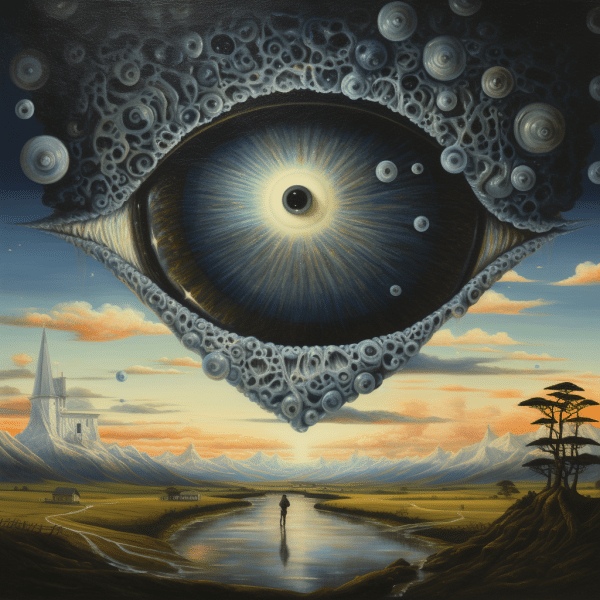

Nature of Reality: an ever-puzzling concept. It is the whole of existence, all we perceive and experience. From tiny particles to the vast universe, reality encompasses all.
To understand it, we must explore multiple disciplines. Physics studies physical laws and forces, providing insight into reality’s building blocks. Philosophy asks questions about perception, consciousness, and being. Metaphysics probes the nature of reality.
Subjectivity is a key factor in our understanding of reality. Our senses filter information, creating personal experiences. Objective truths exist, though, and can be discovered through evidence and inquiry.
Tip: Look at reality from different angles. Curiosity leads you to a better understanding of the world. Explore multiple disciplines to unravel reality’s mysteries.
Philosophical Perspectives on the Nature of Reality
Exploring reality has been a major philosophical interest for ages. Philosophers have tried to discover the secrets of our existence.
The idealistic perspective is a famous opinion. George Berkeley believed that reality is made of ideas and perceptions. For him, physical things only exist because we perceive them. This idea challenges our understanding and poses critical questions.
Materialism is another idea. It claims that reality is only based on matter and its actions. This belief states that everything can be explained with science, not supernatural powers. It relies on evidence and scientific thinking.
Dualism is the notion that reality consists of two distinct objects – the material body and the immaterial mind or soul. Dualists argue that these two parts interact and give us experiences and perceptions. It provokes questions about how these two components fit together.
Besides these main perspectives, there are lots of other theories on reality. These range from practical theories to metaphysical theories.
Considering the nature of reality is captivating and entices philosophers of all times. Exploring these diverse beliefs allows us to grow intellectually and question our understandings. So, let’s join the philosophical conversation about reality and open up our minds!
Scientific Approaches to Understanding Reality
Scientific approaches to understanding reality involve various methods and techniques. Researchers employ these to gain insight into our existence. Structured frameworks enable scientists to uncover profound mysteries.
- Observation & Measurement: Gathering data via controlled settings to draw conclusions about underlying principles.
- Hypothesis Testing: Formulate hypotheses and experiments to refine understanding & discard incomplete explanations.
- Mathematical Modeling: Represent complex systems and relationships with mathematics; make predictions, simulate & verify theories.
- Data Analysis: Analyze data using statistical methods; identify patterns, draw correlations & derive meaningful insights.
- Theoretical Frameworks: Laws, theories & paradigms to organize knowledge & make sense of diverse phenomena.
- Collaborative Research: Interdisciplinary collaboration for complex problems; creativity & innovation in investigations.
Technology has expanded our ability to explore reality. Powerful telescopes & cutting-edge microscopes unlock new dimensions.
Open-minded discussions & diverse perspectives enhance understanding, fuel progress & lead to groundbreaking discoveries.
Cultural and Religious Views on Reality
Humans have always been inquisitive about the nature of reality. Cultural and religious views offer insight into how societies perceive and interpret the world. These beliefs and philosophies range widely, offering unique glimpses into our existence.
- Asian Philosophies: Taoism, Buddhism, Hinduism, and Confucianism promote interconnectedness and consider reality as illusory or short-lived.
- Indigenous Perspectives: Indigenous cultures generally possess spiritual beliefs that advocate harmony with nature and the unity of all living beings.
- Abrahamic Religions: Judaism, Christianity, and Islam trust in a single divine creator who controls reality and has a purpose for humanity.
- Ancient Mythologies: Ancient civilisations like the Greeks and Egyptians employed mythologies to explain natural events and supernatural forces which shape reality.
- Western Philosophies: Plato, Descartes, and Kant proposed various theories about the nature of reality, including ideas on perception, consciousness, and universals.
New Age Spirituality:
Recently, alternative spiritual beliefs have grown in popularity, mixing elements from various traditions to investigate personal realities and consciousness.
These cultural and spiritual perspectives show the colourful spectrum of human thought when it comes to understanding reality. Each view provides its own unique lens to comprehend our surroundings.
By examining these outlooks, we can better grasp reality by testing our assumptions and providing different frameworks for interpretation. Embracing dissimilarity helps us empathise with others’ experiences and comprehend our world.
To further comprehend reality, it is critical to engage in open-ended dialogue with people from different backgrounds. This encourages a sharing of ideas and encourages mutual respect, resulting in a more complete perspective.
Moreover, practices such as meditation, reflection, and contemplation can help delve deeper into our perceptions and question the nature of reality. These activities promote self-awareness and provide tools for personal development and exploration.
By proactively researching diverse cultural and religious perspectives on reality, we can extend our boundaries and deepen our understanding of the intricate web of human life. Accepting diversity in thought ultimately enhances our own perceptions, aiding us to navigate the complex system of reality with more clarity and appreciation.
The Nature of Consciousness and Reality
What is reality’s nature? Philosophers, scientists, and truth-seekers have long been fascinated by this question. To understand consciousness and reality, we must explore our existence’s fundamental essence and comprehend the intricate tapestry that forms our world’s perception.
Consciousness: what is it? Some say it originates from the brain’s complex neural processes, while others think it goes beyond physical bodies. Examining this enigma brings up philosophical and metaphysical queries that defy understanding.
Reality: is it independent of our perceptions, or only existing within our minds? Life confronts us with an array of sensory inputs that shape our reality experience. This variability uncovers questions about reality’s true nature and how much control we have over it.
Quantum physics studies show bewildering phenomena. The double-slit experiment showed particles can be both waves and particles until observed. This implies a profound connection between consciousness and reality.
Ancient wisdom traditions offer insight into this ever-present query. Hindu philosophies speak of Maya, an illusionary world made by divine consciousness. Buddhism teaches impermanence as an aspect of existence. These views give us alternative approaches to unlock the mysteries.
Throughout history, great thinkers pushed boundaries of understanding. Descartes declared, “I think, therefore I am,” highlighting the inseparable link between consciousness and self-awareness. The Enlightenment era favored reason and empirical examination, but ignored certain subjective elements.
The Implications of Different Views on Reality
The nature of reality has a long history of captivating thinkers. Different opinions on reality have huge consequences for how we understand the world and our place in it. Exploring these distinct views can help us gain a better understanding of reality and its effect on our lives.
Materialism claims that only physical matter exists. It states that consciousness is just a result of brain activity, and there is no room for spiritual elements. This viewpoint looks at us as physical beings and uses empirical evidence to explain reality.
Idealism, on the other hand, states that reality is essentially mental or experiential. It claims that everything is part of a larger consciousness. This means that reality is based on our perceptions rather than external physical objects. This contradicts traditional beliefs and leads to questions about the true nature of consciousness.
Dualism also looks at reality in a different way. It believes that there are two substances: mind and matter. Dualists say that consciousness can’t be explained by physical processes alone and must include an intangible part. This has an effect on how we interpret the relationship between mind and body, and on our thoughts on the possibility of an afterlife.
Albert Einstein’s Theory of Relativity is an example of the implications of different views on reality. It challenged Newtonian physics and changed the way we think about space, time, and gravity. It showed us that reality is more complex than we thought.
Examining different perspectives on reality gives us insight into existence. Investigating these views helps us comprehend the universe and ourselves, enabling us to get a clearer picture of reality. Whether it is through materialism, idealism, or dualism, exploring these different outlooks helps us unravel the mysteries of reality and appreciate the complexity of our existence.
Conclusion: The Ongoing Debate on the Nature of Reality
Reality has been debated by scholars, scientists, and philosophers for centuries. What is real? What is illusion? How do we perceive our surroundings?
One view suggests reality is objective and independent of us. It claims truth and laws exist outside our experience.
Others propose reality is subjective and shaped by individual perspectives. It may not be fixed, but instead vary from person to person.
Quantum physics adds an interesting layer to the debate. It suggests particles can exist in multiple states until measured or observed. This raises questions about observation and its effect on reality.
The answer remains unclear. As new discoveries and ideas emerge, our understanding of reality expands. We must collaborate between fields such as philosophy, physics, psychology, and neuroscience to gain a holistic perspective on this phenomenon.
We may never fully grasp the true nature of reality. Nevertheless, our pursuit might lead us closer to understanding its enigmatic secrets.
Albert Einstein famously said, “Reality is merely an illusion, albeit a very persistent one.”
Frequently Asked Questions
Q: What is the nature of reality?
A: The nature of reality refers to the fundamental characteristics and principles that govern the existence and functioning of the universe.
Q: Is reality objective or subjective?
A: There is ongoing debate regarding the objectivity or subjectivity of reality. Some argue that reality is objective and exists independently of human perception, while others propose that it is subjective and shaped by individual experiences and interpretations.
Q: Are there multiple realities or just one?
A: The concept of multiple realities is explored in various philosophical and scientific theories. Some suggest the existence of parallel universes or alternate dimensions, whereas others argue for a singular reality experienced differently by different individuals.
Q: How do we perceive reality?
A: Perception of reality involves the interpretation of sensory information by our brains. Our senses gather data from the external world, and our brains process and construct perceptions based on that data.
Q: Can reality be completely understood or is it unknowable?
A: The extent to which reality can be understood is a subject of philosophical inquiry. While scientific discoveries provide insights into the workings of the universe, some argue that the true nature of reality might be beyond human comprehension.
Q: Does consciousness play a role in shaping reality?
A: Consciousness is a complex phenomenon, and its relationship with reality remains a topic of exploration. Some propose that consciousness actively shapes our perception and experience of reality, while others argue that it is an emergent property of physical processes.








